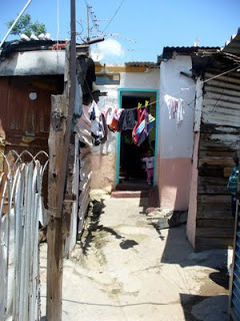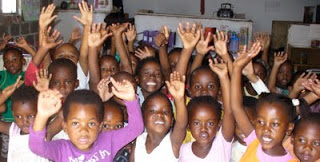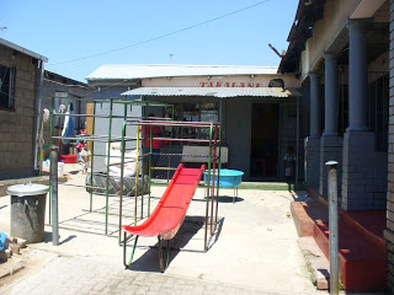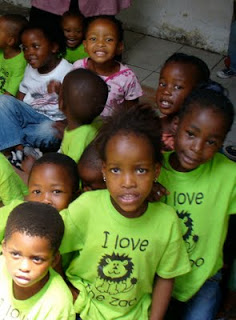|
I drove right past the Johannesburg College, Alexandra Campus on London Road. The slum of Alex stretched to my right. Warehouses rose along the road to my left. When I was sure I had gone too far, there was nothing to do, but turn around in the crumbling lot of a business and retrace my route through the heavy traffic. Believe me, I was saying a lot of prayers! But I found it. The security guard held out his book for me to sign and say where I was going in the complex. “Actually, I’m not going in. I’m here to meet someone.” “Someone from outside or inside?” he asked so suspiciously that I was afraid he would tell me to move my car. “Someone who works with Rose Act, the group that is here on Saturdays.” The guard smiled and gave me a thumbs-up. Rose Act has a reputation around here. Soon Anna arrived, a tiny woman with a big smile. She is probably no older than I am, but has led a harder life. I gave her the cloth doll I had bought in Kenya. The plan is for her neighbor, who is an accomplished seamstress, to use it to make a pattern so some of the ladies in Alex can make a South African version to sell. Then Anna hopped in the car and we were off to read stories in crèches. “Turn right here. Left at the stop sign. Left again. Now right.” She directed me through the narrow streets of Alex. Our first stop was Sindisa’s Creche. Sindisa is a relative. Her house is in a newly built section of town close to the highway. This house was obviously built with a pre-school in mind. There were three large classrooms in back. The children were nicely washed and cleanly dressed. They sat still, without shoving. Of course they weren’t quiet—not after I brought out Water Hole Waiting and they spotted the monkeys on the front—but they listened politely and all their noise was shouts of recognition of what they saw in the book. Second stop was Takelani. Takelani means “Be happy” in the Venda language. It is also the name of the South African version of Sesame Street. But this crèche consists of two cement-block houses up separate alleys. I have read there a couple times before and was enthusiastically received. The children understood less English. Their teacher translated a little. Mostly the children just laughed and shouted the names of the animals they saw.  Didonza is even further up an even narrower alley in the shadow of the huge barracks that once housed two thousand mine workers. Now no one knows how many crowd its rooms. Shacks line the outer walls of the barracks and spill into the street. The children here speak almost no English although a sunshade has been put over the tiny courtyard and the floor leveled and tiled since the last time I was here. The Didonza children had a hard time identifying the hippos and giraffe in the pictures, but they shouted out the next number in the counting book Emeke’s Gift. So much joy from one morning’s wandering through the alleys with a bag of books and a friend to show me the way. If I still lived in South Africa, I would be tempted to do it every week.
0 Comments
Leave a Reply. |
AuthorLeAnne Hardy has lived in six countries on four continents. Her books come out of her cross-cultural experiences and her passion to use story to convey spiritual truths in a form that will permeate lives. Add http://www.leannehardy.net/1/feed to your RSS feed.
To receive an e-mail when I post a new blog, please subscribe.
Categories
All
Archives
November 2022
|



 RSS Feed
RSS Feed